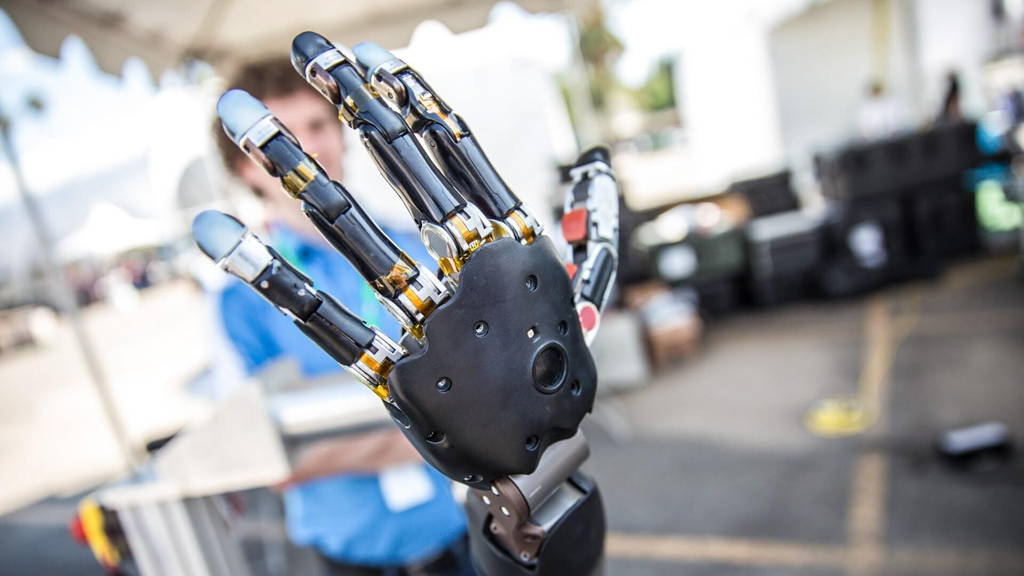The thin-silicon chip is according to an IMEC press release a world’s first for electrode density and was developed in collaboration with researchers at the University of Florida, as part of the IMPRESS project funded by the DARPA’s HAPTIX program to create a closed-loop system for future-generation haptic prosthetics technology.
Current arm prosthetics technologies have been shown to give patients the ability to move their artificial arm and hand to grasp and manipulate objects. This is done by reading out signals from the person’s muscles or peripheral nerves to control electromotors in the prosthesis thereby conveying intent.
According to Rizwan Bashirullah, associate professor of Electrical and Computer Engineering, and director of the University of Florida’s IMPRESS program (Implantable Multimodal Peripheral Recording and Stimulation System), this effort aims to create such new peripheral nerve interfaces with greater channel count, electrode density, and information stability, enabled largely by imec’s technological innovation.”
Through a needle attached to the chip, the package can be inserted and attached inside a nerve bundle, further increasing the precision of reading and stimulation compared to current technology which has substantially fewer electrodes and is wrapped around the nerve bundle. In practice, imec’s solution will aim to give patients more control over their prosthetic arm and hand, and also the possibility of a finer haptic feedback.
###Imec###
“A new biocompatible chip encapsulation technology is used, based on the stacking of nanolayers with superior diffusion barrier properties, alternating with very thin polymer layers with excellent mechanical behavior,” adds Maaike Op de Beeck, program manager at imec. “The final result is an ultrathin flexible electronic device with a thickness comparable to that of a human hair, hence ultimately suitable for minimal invasive implantation.”
About Imec, UF
Imec is a research and innovation hub in nano-electronics and digital technologies. It has a global ecosystem of partners across a multitude of industries and works on innovation in application domains such as healthcare, smart cities and mobility, logistics and manufacturing, and energy. Imec is headquartered in Leuven, Belgium and also has distributed R&D groups at a number of Flemish universities, in the Netherlands, Taiwan, USA, China, and offices in India and Japan. The University of Florida is one of the nation’s largest public universities and is the only member of the Association of American Universities in the state of Florida.
Current arm prosthetics technologies have been shown to give patients the ability to move their artificial arm and hand to grasp and manipulate objects. This is done by reading out signals from the person’s muscles or peripheral nerves to control electromotors in the prosthesis thereby conveying intent.
No feeling of touch
Although very helpful, these prosthetics still don’t allow a fine motor control and don’t give patients a feeling of touch. Future advanced prosthetics under development should provide amputees with rich sensory content from these artificial limbs by delivering precise electrical patterns to the person’s peripheral nerves using implanted electrode interfaces.According to Rizwan Bashirullah, associate professor of Electrical and Computer Engineering, and director of the University of Florida’s IMPRESS program (Implantable Multimodal Peripheral Recording and Stimulation System), this effort aims to create such new peripheral nerve interfaces with greater channel count, electrode density, and information stability, enabled largely by imec’s technological innovation.”
Fine-grained stimulation and recording
As part of IMPRESS, imec has made a prototype ultrathin (35µm) chip with a biocompatible, hermetic and flexible packaging. Its surface contains 64 electrodes, with a possible extension to 128. This ‘exceptionally’ high amount of electrodes allows fine-grained stimulation and recording.Through a needle attached to the chip, the package can be inserted and attached inside a nerve bundle, further increasing the precision of reading and stimulation compared to current technology which has substantially fewer electrodes and is wrapped around the nerve bundle. In practice, imec’s solution will aim to give patients more control over their prosthetic arm and hand, and also the possibility of a finer haptic feedback.
###Imec###
Next phase
“Our expertise in silicon neuro-interfaces made imec a natural fit for this project, where we have reached an important milestone for future-generation haptic prosthetics,” commented Dries Braeken, R&D manager and project manager of IMPRESS at imec. “These interfaces allow a much higher density of electrodes and greater flexibility in recording and stimulating than any other technology.” With the completion of this prototype and the first phase of the project, in the next phase imec will make the prototype ready for long-term implanted testing.“A new biocompatible chip encapsulation technology is used, based on the stacking of nanolayers with superior diffusion barrier properties, alternating with very thin polymer layers with excellent mechanical behavior,” adds Maaike Op de Beeck, program manager at imec. “The final result is an ultrathin flexible electronic device with a thickness comparable to that of a human hair, hence ultimately suitable for minimal invasive implantation.”
About Imec, UF
Imec is a research and innovation hub in nano-electronics and digital technologies. It has a global ecosystem of partners across a multitude of industries and works on innovation in application domains such as healthcare, smart cities and mobility, logistics and manufacturing, and energy. Imec is headquartered in Leuven, Belgium and also has distributed R&D groups at a number of Flemish universities, in the Netherlands, Taiwan, USA, China, and offices in India and Japan. The University of Florida is one of the nation’s largest public universities and is the only member of the Association of American Universities in the state of Florida.






